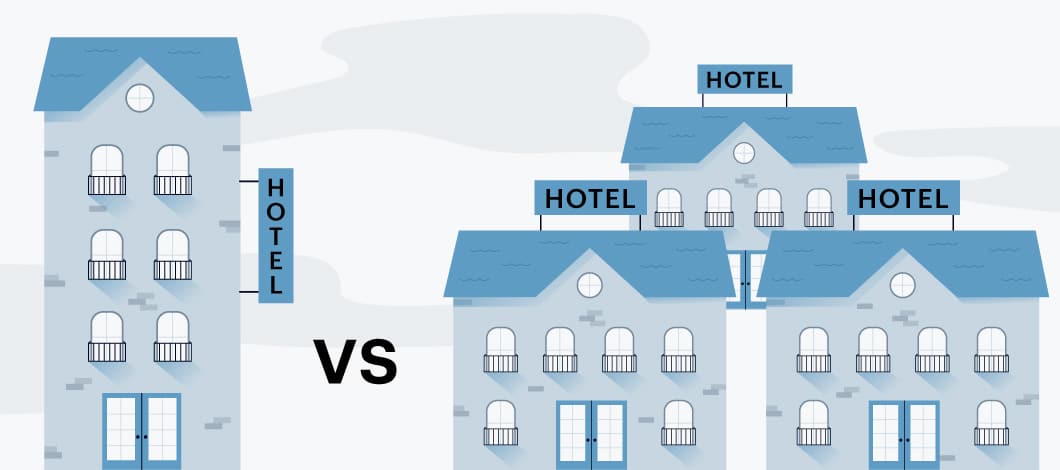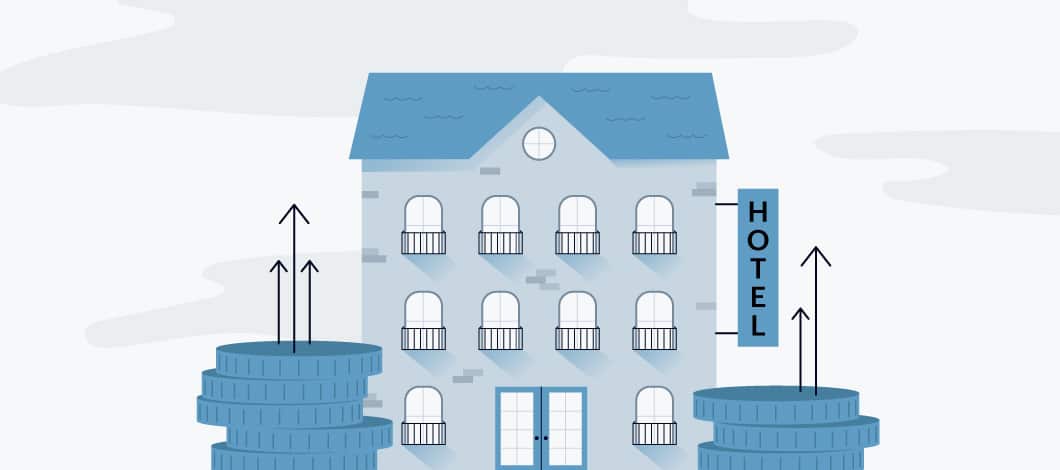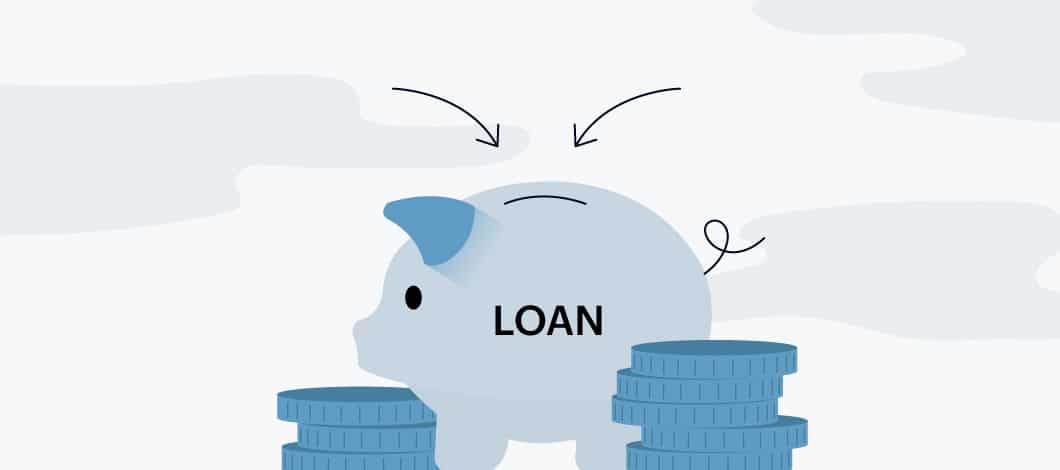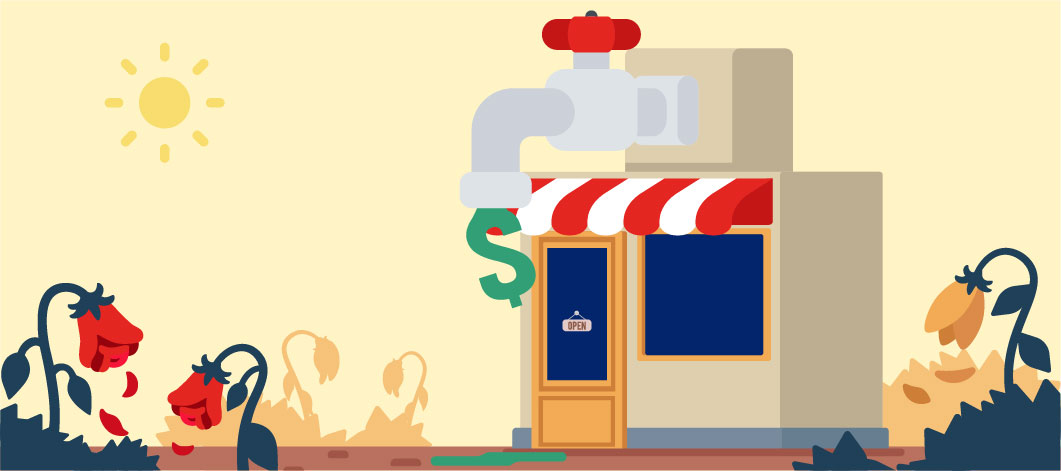There are multiple factors to consider before buying and running a small hotel. You’ll have to weigh what you can afford when you buy a hotel and evaluate the average hotel and motel prices in your target area. The hospitality industry is highly competitive, with so many large, established brands already inhabiting the top markets. Consider the competition when you decide whether you want to be part of a franchise or operate a standalone property.
Here’s everything you need to know before taking the plunge into buying a hotel or motel.
What to Know Before You Buy a Hotel or Motel
If you’re just entering the hospitality business, or if this is your first investment into a hotel or motel, buying an existing property is probably your best approach. New construction is an option, but it requires a much more significant investment. You’ll also need to have experience in real estate development and managing a construction project if you want to be successful, although you could outsource this work.
When purchasing an existing hotel or motel property, here’s what you need to consider.
Location is Everything
Most experts will tell you that location is everything in the hospitality business. And they’re not wrong — there’s a reason so many hotels are clustered around airports.
But traffic patterns, thoroughfares and proximity to attractions and amenities aren’t your only concern when it comes to location. The market that already exists in the town or city where you intend to buy your property is also among the considerations when buying a hotel.
In most places, you can choose among plenty of established hotels and motels. To boost your chances of success, try looking for a location that has a gap in the market. For example, there might be too many hotels that cater to high-income clientele and not enough budget options for middle-income travelers. Or, the market could have plenty of chain motels but not enough locally inspired options.
Location also impacts prices — a standard motel room in New York City will have a much higher price than one in Joplin, Missouri. Research the average cost of a particular area’s hotel and motel stays and use that information in your business plan. Areas with low prices and less competition might not have much business in the first place. However, higher-priced markets might be difficult to compete in if you can’t offer the amenities guests have come to expect from the area.
Of course, if you are attached to a particular town (such as your hometown), you could buy a hotel or motel there regardless of the market. Being a local could have its advantages, too. If you already have a strong network in-town, you can use it to find great local suppliers. Being a local hotel or motel owner can also set you apart from larger chains in the area.
Upfront Costs Can Be High
Building a hotel or motel is significantly more expensive than buying an existing property. You’ll need to pay for the cost of labor, materials and permits, among other expenses.
Buying an existing hotel or motel is much easier and less expensive, but it’s still a significant investment. How much is it to buy a hotel franchise? According to Entrepreneur magazine, an initial investment into a Days Inn franchise can cost a minimum of $194,401 with a franchise fee of $35,000. Other brands, such as Hampton by Hilton, can cost millions of dollars.
Nonetheless, this type of transaction will be much easier to finance because it’s less risky for a bank than a new construction project. With a franchise, you’d be working under the umbrella of an established brand and its guidelines. Having the brand name behind you could make financing easier, too.
Financing to Buy a Hotel or Motel
In addition to your initial purchase of the property or franchise, you’ll need to consider other expenses when you take out a loan. An existing property might require renovations. You’ll also need to furnish your property, install fixtures, purchase equipment and restock supplies. It can also be a good idea to obtain some working capital to cover early expenses.
Generally, there are 4 types of loans you when you’re considering how to buy a hotel: conventional loans, SBA 7(a) Loans, SBA 504 Loans, and USDA Rural Development Business and Industry (B&I) Loans.
Conventional Loans
A conventional loan is one that comes from a bank or other financial institution. You’ll need to have strong borrowing credentials to qualify for this type of loan. Having an existing relationship with the financial institution also helps.
The limits of your loan will depend on the financial institution. If you have a good credit score, a solid business plan, good insurance and strong personal financial details, you could qualify for all the money you need to buy a hotel or motel and obtain a good interest rate.
SBA 7(a) Loans for Commercial Real Estate
The U.S. Small Business Administration’s (SBA) 7(a) loan program is specifically designed to provide financial assistance to small businesses. You can get a maximum loan amount of $5 million through this program. However, you might need collateral for loans in excess of $350,000, and you might need that much to buy a hotel.
This is a good option for small operations, or if you don’t want to go with a conventional loan.
SBA 504 Loans
The SBA 504 Loan program helps businesses purchase or refinance commercial property. It is designed for businesses that “do not qualify for conventional financing,” according to the Small Business Administration.
With this loan, you only have to contribute 10% of the project costs, or 20% in some circumstances. The SBA provides funds for 40% of the project and a participating lender called a Certified Development Company (CDC) provides up to 50% of the funds. CDCs are non-profits that provide funds for community development.
If you can’t get financing elsewhere and are wondering how to buy a hotel or how to buy a motel business, this could be a good option.
USDA B&I Loans
If you’re buying a hotel or motel in a rural area, you might be eligible for a U.S. Department of Agriculture Business and Industry Loan (USDA B&I). This program works with accredited lenders to offer loan guarantees to rural businesses. Only businesses that operate outside a city or town with a population of fewer than 50,000 people are eligible for this loan.
You can borrow up to $25 million through this program, but the USDA guarantees a smaller percentage of the loan the more you borrow. For example, they only guarantee 70% for loans between $5 million and $10 million and 60% for loans exceeding $10 million.
It’s important to remember that making your initial investment is only half of the equation. Once you own a hotel or motel, you need to make it profitable.
This means treating your investment like any other business. You’ll need a business plan and a business structure, and you’ll need to incorporate if you haven’t yet. Take care of these details before you seek financing.

Owning a Hotel or Motel Franchise vs. a Single Property
Owning a single property allows you more independence, but working within a franchise enables you to get up and running much faster. The choice you make depends on your management style, your dreams for your business, and other factors, such as your budget.
Owning a Single Property
If you’re running a small operation without any amenities, you may be able to run your property as a family business or retain a small staff. But if you want to add amenities like food service or a lounge, or if you want to expand, you’ll need additional permits and staff to stay operational.
If this is your first time buying a hotel or motel and you don’t want to work with a franchise, buying a single property and operating it without any amenities might be a good way to start. Location will be paramount, but if you can turn a profit on a single property, you can consider expanding, piece by piece.
If you don’t want to take a hands-on approach to managing your hospitality business, you can hire a hotel manager for day-to-day tasks. You could also work with a third-party hotel management company.
Owning a Franchise
Owning a hotel or motel franchise allows you to start a business without starting from scratch. The upfront costs are generally lower, and you’ll have a large company to provide you with guidance and support. Many of the more challenging aspects of business, such as branding and marketing, can be taken care of by your franchisor. It may also be easier for you to qualify for financing if you go with a franchise.
On the other hand, you’ll be beholden to your franchisor by way of a formal agreement. The brand will be able to dictate how you run your business, so there’s little room for creativity or customization. You might be restricted in where you operate your business and which suppliers you use, as well as what messaging you use to market your hotel or motel.
Working within a franchise also means sharing profits. Although you own your business, your franchisor may require you to pay fees or chip in a percentage of what you make.
Buying Your Hotel or Motel
If you decide to go with a franchise, you can expect a great deal of hand-holding — but that might be just what you need. If you go into business on your own, you may have more of a challenge getting started, but you’ll have more opportunities to build the hotel or motel you’ve always wanted.
Before buying a hotel or motel, remember to do your homework. Draw up a business plan and determine where and how you’ll operate your business before you start looking at financing options.












